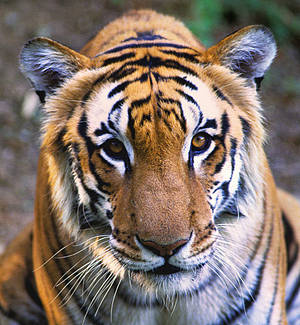Russia Far East hosts major tiger party
Every year on the last Sunday in September, Vladivostok turns orange with stripes.
This year, as it hosts its annual Tiger Day on Sunday, Sept. 26th, the largest city in the Russian Far East will be buzzing with extra excitement as festivities take place prior to the first ever Global Tiger Summit to be held in Russia in the city of St. Petersburg from Nov. 21-24.
 |
|
Tiger (Panthera tigris), India.[WWF] |
At the Summit, Russia will host ministers and heads of state from the 13 countries that still have tiger populations to sign a declaration on joint cooperation for tiger conservation, and to initiate a global tiger recovery program which seeks double the iconic species' numbers by the year 2022. The wild tiger population currently stands at a historic low of just 3,200.
Tiger Day is the biggest eco-celebration in the Russian Far East. Citizens of Vladivostok, students and representatives of many organizations wear orange from head to toe and join the tiger parade that moves through the center of the city. Participants show that they are proud to live in the land of the tiger, and that they are concerned about the tiger's future.
The Amur tiger, the largest of the six big cat sub-species that still survive, numbers only about 500 and lives in the forests of the Russian Far East near Vladivostok and in Northeastern China.
This year's edition of Tiger Day will also include special guests: members of the youth German-Russian expedition "On the Footpath of the Tiger." The expedition connects young tiger enthusiasts from 18 to 24 years old, and also includes journalists and World Wildlife Fund for Nature (WWF) staff members from both countries.
Every member of the expedition has gone through tiger training in the field, including learning how to set photo traps to take a picture of their "own" tiger, equipping a feeding complex for tiger prey, and learning how to count that prey from a specially built platform.
Young German ecologists also have the opportunity to fly in a helicopter around the Shkotovsky plateau to detect forest fires and illegal logging. Expedition members will greet Tiger Day participants in Vladivostok's main square.
Prior to Tiger Day eminent actors and film directors who participated in the 8th international film festival of countries in the Asia-Pacific region, "Meridians of the Pacific", signed a tiger conservation petition aimed at the 13 heads of state where tigers still live in the wild. The petition was signed by Gerard Depardieu, Vensan Peres, Valentina Talyzina, Svetlana Toma, Artemij Troizky and 100 other film festival attendees.
WWF will also hold an eco-lottery during the day, with planting stocks of Korean Pine amongst the prizes. The tree has just received protected status in Russia's Far East cedar forests, and is a vital species in key Amur tiger habitat.
"It is absolutely possible to save and increase the population of our tiger," stated Igor Chestin, WWF Russia CEO. "The question is only in the political will. Russia has to accept a plan of action for the conservation of the Amur tiger and must provide adequate funding from its federal budget."
Tiger day was first celebrated in Vladivostok in the year 2000. The event grows every year in the Russian Far East. Nature reserves in the Far East also take an active part in the day, and hold their own celebrations in smaller cities and villages.
In addition to Moscow Zoo, nature parks and zoos throughout the USA and Europe, as well concerned people from countries all over the world, have joined in and now organize their own celebrations for the Tiger on the same day.
 0
0 







Go to Forum >>0 Comments